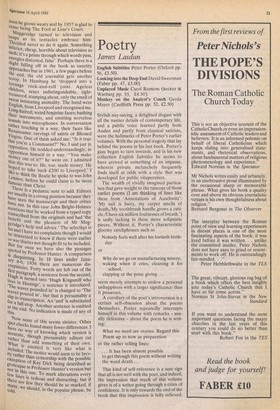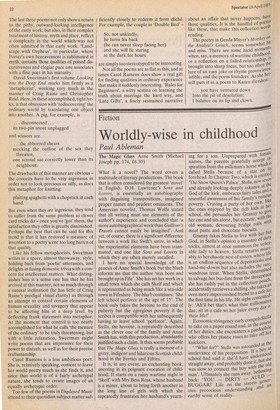Poetry
James Lasdun
English Subtitles Peter Porter (Oxford pp. 56, £3.50).
-Looking into the Deep End David Sweetman (Faber pp. 47, £3.00) Unplayed Music Carol Rumens (Seeker az. Warburg pp. 53, £4.50).
Monkey • on the Analyst's Couch Gerda Mayer (Ceolfrith Press pp. 52, £2.50) Stylish nay-saying, a delighted disgust with all the nastier details of contemporary life, and a public voice learned partly from Auden and partly from classical satirists, were the hallmarks of Peter Porter's earlier volumes. With the personal tragedy that lay behind the poems in his last book, Porter's gaze began to turn inwards, and in his new collection English Subtitles he seems to have arrived at something of an impasse, wherein private melancholy frequently finds itself at odds with a style that was developed for public vituperation. The wealth of vividly imagined particulars that gave weight to the rancour of those earlier poems (I am thinking of lines like these from 'Annotations of Auschwitz': 'My suit is hairy, my carpet smells of death,! My toothbrush handle grows a cuticle./I have six million foulnesses of breath.') is sadly lacking in these more solipsistic pieces. Without it, Porter's characteristic gloomy catchphrases such as Nobody feels well after his fortieth birthday or Why do we go on manufacturing misery, waking when it cries, cleaning it for school, clapping at the prize giving ...
seem merely attempts to endow a personal unhappiness with a larger significance than it possesses.
A corollary of the poet's introversion is a certain self-obsession about the poems themselves. Porter repeatedly interrupts himself in this volume with remarks — usually defensive — about the poem he is writing: What we need are stories. Regard this Poem up to now as preparation or the rather telling lines: It has been almost possible to get through this poem without writing the word death ...
This kind of self-reference is a sure sign that all is not well with the poet, and indeed, the impression that much of this volume gives is of a writer going through a crisis of confidence. It is only towards the end of the book that this impression is fully relieved. The last three poems not only show a return to the pithy, outward-looking intelligence of the early work, but also, in their complex treatment of history, myth and place, reflect a Complexity in the world which•was not often admitted in that early work. 'Landscape with Orpheus', in particular, where Porter's own bereavement is sublimated in myth, contains those qualities of poised discursiveness and elegiac pace one associates with a fine poet in his maturity.
David Sweetman's first volume Looking into the Deep End marks him firmly as a `metaphorise, working very much in the manner of Craig Raine and Christopher Reid. Here, in these accomplished, tight lyrics, is that obsession with 'rediscovering' the ordinary world by translating one object into another. A pig, for example, is . .. disconnected its two-pin snout unplugged and scissors are . ..the abhorred shears mocking the outline of the sex they threaten, one scrotal sac correctly lower than its neighbour.
The drawbacks of this manner are obvious– the conceits have to be very ingenious in order not to look precious or silly, as does this metaphor for knitting: plaiting spaghetti with a chopstick in each hand.
But even when they are ingenious, they tend to suffer from the same problem as clever card tricks do once you've 'got' them, the satisfaction they offer is greatly diminished. Perhaps the best that can be said for this trend is that it has restored a measure of invention to a poetry scene too long barren of that quality.
Like his fellow metaphorists, Sweetman writes in a spare, almost throwaway, style, holding back from 'poetic' utterances, and delights in fusing domestic trivia with a concern for intellectual matters. What distinguishes him is a sense one has that he has arrived at this manner, not so much through a natural inclination (he has little of Craig Raine's prodigal visual clarity) as through an attempt to control certain elements of human sexuality and savagery that appear to be affecting him at a deep level, by deflecting frank statement into metaphor. At the moment that control is too neatly accomplished for what he calls 'the menace of the ordinary' to be truly threatening, but with a little relaxation, Sweetman might write poems that are impressive for their power to disturb, as well as for their precise craftsmanship.
Carol Rumens is a less ambitious poet. She is, relatively speaking, content to leave her world pretty much as she finds it, and since that world is of a fairly archetypal nature, she tends to create images of an equally archetypal order.
Too few of the poems in Unplayed Music attend to their quotidian subject matter suf ficiently closely to redeem it from cliche. For example, the couple in 'Double Bed' – So, not unkindly, he turns his back (he can never sleep facing her) and she will lie staring at the dark for hours are simply too stereotyped to be interesting.
Not all the poems are as flat as this, and at times Carol Rumens does show a real gift for finding qualities in ordinary experience that make it suddenly interesting. 'Rules for Beginners', a witty sestina on learning the truth about marriage the hard way, and 'Late Gifts', a finely restrained narrative about an affair that never happens, have those qualities. It is the handful of pools like these, that make this collection wort' reading. The poetry in Gerda Mayer's Monkey on the Analyst's Couch, seems somewhat Int and miss. There are some lucid moments when, say, a memory of wartime childhood, or a reflection on a failed relationshiP, is brought into sharp focus, but too often the lure of an easy joke or rhyme proves irres. istible, and the poem founders. As she her self puts it in a poem to Karen Gershon: . you have ventured down Into the pit of desolation; I balance on its lip and clown.







































 Previous page
Previous page